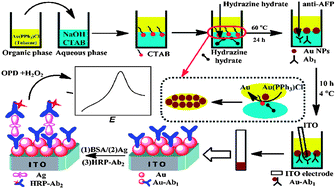
Synthesis of gold-antibody nanocomposite and AFP immunoassay
The construction of successful biosensors is often hampered by the difficulty of immobilising biomolecules onto the desired surface in an orderly fashion. As a support medium, nanoparticles display a particularly large surface-to-volume ratio and their physical properties can be adjusted to match requirements.
Researchers led by Zhihui Dai from the Nanjing Normal University, China, have used a liquid-liquid interface technique to immobilise Ab1 antibodies onto gold nanoparticles, characterising the material using energy dispersive spectroscopy (EDS).
Detection of abnormal levels of alpha-fetoprotein (AFP) can indicate the presence of cancerous cells. In this work, a sandwich immunoassay was used to test the sensitivity of the Au-Ab1 nanocomposite towards AFP, demonstrating good selectivity, stability and reproducibility of the sensor. In clinical samples, the gold-based sensor performed well against the current enzyme-linked immunosorbant assay (ELISA) method of testing.
Do you want to know more about this research? Click on the link below, this article will be free to read until April 19th:
Gold–antibody nanocomposite thin film fabricated by a liquid–liquid interface technique and its application for the sensitive immunoassay of alpha-fetoprotein
Kun Wang , Tianxiang Wei , Wenwen Tu , Min Han and Zhihui Dai
Anal. Methods, 2013,5, 1909-1914
DOI: 10.1039/C3AY26541B










